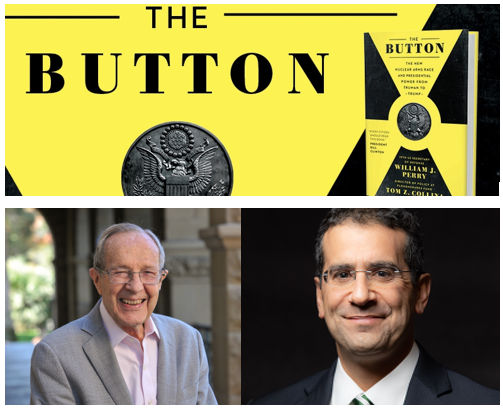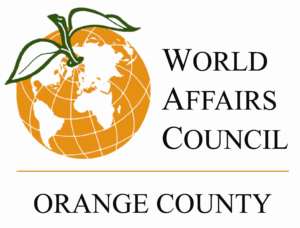The Button: The New Nuclear Arms Race and Presidential Power from Truman to Trump

The President has the power to turn the world to ash in minutes with a single “push of a button” without permission from Congress or any other defense authority in the United States.
Since the Truman administration, America has been one “push of a button” away from nuclear war—a decision that rests solely in the hands of the President. Without waiting for approval from Congress or even the Secretary of Defense, the President can unleash America’s entire nuclear arsenal.
Almost every governmental process is subject to institutional checks and balances. Why is potential nuclear annihilation the exception to the rule? For decades, glitches and slip-ups have threatened to trigger nuclear winter: misinformation, false alarms, hacked warning systems, or even an unstable President. And a new nuclear arms race has begun, threatening us all. At the height of the Cold War, Russia and the United States each built up arsenals exceeding 30,000 nuclear weapons, armed and ready to destroy each other—despite the fact that just a few hundred are necessary to end life on earth. Source: Ploughshare
Join us on Thursday, August 6th at 2 p.m. EDT for a conversation with William Perry, Secretary of Defense in the Clinton administration and Undersecretary of Defense for Research and Engineering in the Carter administration, and Tom Z. Collina, the Director of Policy at Ploughshares Fund as they share historical insight into the nuclear launch authority and the threat of nuclear war in the world today through interviews with former President Bill Clinton, former Secretary of Defense Jim Mattis, and others.
Promotional Partner
WACC Distinguished Speaker Series
Date: Thursday, August 6, 2020
Time: 2:00 – 3:00 p.m.
Registration for this program is full. Please contact us at info@worldaffairscharlotte.org to join the wait list.
Biography
Tom Collina: As director of policy, Tom Collina brings 25 years of Washington, DC experience in nuclear weapons, missile defense and nonproliferation issues to Ploughshares Fund. He has worked extensively as a researcher, analyst, and advocate to strengthen the efforts to end US nuclear testing, rationalize anti-missile programs, extend the Nonproliferation Treaty, and secure Senate ratification of the New START Treaty among others.
Prior to joining Ploughshares Fund in 2014, Tom served as Research Director of the Arms Control Association. He was the Executive Director and Co-Founder of the Institute for Science and International Security and the Director of the Global Security Program at the Union of Concerned Scientists, among other leadership positions. He has published widely in major magazines and journals and has appeared frequently in the national media, including The New York Times, CNN, and NPR. He has testified before the Senate Foreign Relations Committee and regularly briefs congressional staff. Tom has a degree in International Relations from Cornell University.
William Perry: William Perry is the Michael and Barbara Berberian Professor (emeritus) at Stanford University. He is a senior fellow at the Freeman Spogli Institute and the Hoover Institution, and serves as director of the Preventive Defense Project. He is an expert in U.S. foreign policy, national security and arms control. He was the co-director of CISAC from 1988 to 1993, during which time he was also a part-time professor at Stanford. He was a part-time lecturer in the Department of Mathematics at Santa Clara University from 1971 to 1977.
Perry was the 19th secretary of defense for the United States, serving from February 1994 to January 1997. He previously served as deputy secretary of defense (1993-1994) and as under secretary of defense for research and engineering 1977-1981). Dr. Perry currently serves on the Defense Policy Board (DPB). He is on the board of directors of Covant and several emerging
high-tech companies. His previous business experience includes serving as a laboratory director for General Telephone and Electronics (1954-1964); founder and president of ESL Inc. (1964-1977); executive vice-president of Hambrecht & Quist Inc. (1981-1985); and founder and chairman of Technology Strategies & Alliances (1985-1993). He is a member of the National Academy of Engineering and a fellow of the American Academy of Arts and Sciences.
From 1946 to 1947, Perry was an enlisted man in the Army Corps of Engineers, and served in the Army of Occupation in Japan. He joined the Reserve Officer Training Corps in 1948 and was a second lieutenant in the Army Reserves from 1950 to 1955. He was awarded the Presidential Medal of Freedom in 1997 and the Knight Commander of the British Empire in 1998. Perry has received a number of other awards including the Department of Defense Distinguished Service Medal (1980 and 1981), and Outstanding Civilian Service Medals from the Army (1962 and 1997), the Air Force (1997), the Navy (1997), the Defense Intelligence Agency (1977 and 1997), NASA (1981) and the Coast Guard (1997). He received the American Electronic Association’s Medal
of Achievement (1980), the Eisenhower Award (1996), the Marshall Award (1997), the Forrestal Medal (1994), and the Henry Stimson Medal (1994). The National Academy of Engineering selected him for the Arthur Bueche Medal in 1996. He has received awards from the enlisted personnel of the Army, Navy, and the Air Force. He has received decorations from the governments of Albania, Bahrain, France, Germany, Hungary, Japan, Korea, Poland, Slovenia, and Ukraine. He received a BS and MS from Stanford University and a PhD from Pennsylvania State University, all in mathematics.



